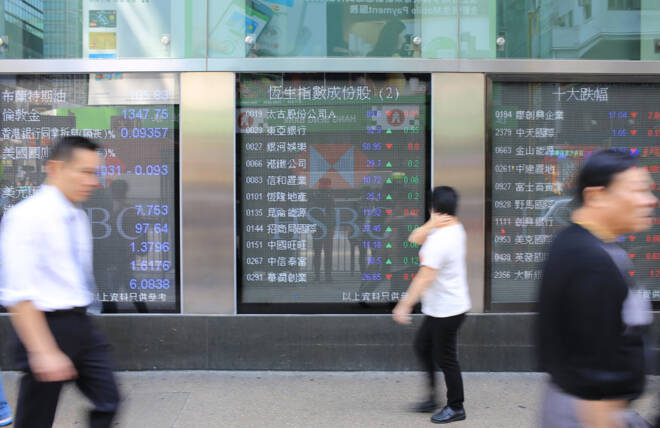Advertisement
Advertisement
Hang Seng and ASX 200 Gain, Nikkei Struggles as Investors Weigh US Rate Path
By:
Key Points:
- Hang Seng rallies 1.65% on stimulus and earnings optimism as IMF cuts China’s growth forecast, raising market uncertainty.
- Nikkei slips 0.25% despite USD/JPY at 151.72, as rising US Treasury yields pressure tech stocks like Tokyo Electron.
- ASX 200 edges 0.03% higher as mining and banking stocks gain, countering losses in tech driven by rising US Treasury yields.
US Markets Mixed as Treasury Yields Rise, Investors Eye Fed Rate Path
On Tuesday, October 22, US equity markets had another mixed session. The Nasdaq Composite Index extended its gains from Monday, advancing by 0.18%. However, the Dow and the S&P 500 edged lower, falling 0.02% and 0.05%, respectively.
In the bond markets, 10-year US Treasury yields climbed to 4.210% after an 11 basis point rise on Monday. Rising yields impacted buyer demand for riskier assets as expectations of a resilient US economy tempered bets on a December Fed rate cut.
Notably, General Motors (GM) surged by 9.8% on Q3 earnings and forward guidance.
The cautious mood from the overnight US session will likely set the tone for the Wednesday Asian session.
IMF Growth Projections Weigh on China’s Outlook
On Tuesday, the IMF released its economic growth projections, forecasting China’s economy to expand by 4.8% in 2024, down from July’s 5.0% projection.
China’s economy was a focal point, with IMF Chief Economist Pierre-Olivier Gourinchas saying that Beijing’s policy measures may not be enough to boost growth. The IMF attributed China’s weaker economic outlook to lackluster global growth forecasts over the next five years.
However, the IMF did not include China’s fiscal stimulus measures in its growth projections. Stimulus measures targeting private consumption may alter the outlook.
Expert Views on China’s Policy Measures and Economic Outlook
This outlook was further echoed by experts like Alicia Garcia Herrero, who noted,
“Beijing could deploy as much as 6 trillion yuan ($842.9 billion) in new fiscal stimulus, but the fund will be more of a ‘risk package’ to recapitalize banks, clean up sold but unfinished housing units and ease local governments’ hidden debt. This is to solve the deflationary pressure, not to stimulate consumption yet.”
Hang Seng Index Rallies on Stimulus and Earnings Optimism
Shifting the focus to the Asian equity markets, the Hang Seng Index rallied 1.65% on Wednesday morning. Optimism toward an upbeat earnings season and expectations for stimulus measures from Beijing, targeting consumer demand, drove demand for HK-listed stocks.
The real estate and tech sectors were key drivers. The Hang Seng Mainland Properties Index gained 1.28%, while the Hang Seng Tech Index rallied 2.17%. Tech sector stocks, including Baidu (9888) and Tencent (0700), led the gains, advancing by 1.25% and 1.79%, respectively.
Mainland China’s equity markets also trended higher on stimulus bets, with the CSI 300 and Shanghai Composite gaining 0.01% and 0.27%, respectively.
Nikkei Slips Despite USD/JPY Return to 151
Meanwhile, the Nikkei Index slipped by 0.25% in the Wednesday morning session. A stronger USD/JPY pair failed to counter rising Treasury yields despite the USD/JPY gaining 0.43% to 151.721.
Tech stocks felt the effect of rising yields. Tokyo Electron (8035) and Softbank Group Corp. (9984) saw declines of 0.80% and 0.80%, respectively. While tech stocks faced pressure from rising yields, the weaker Japanese Yen boosted demand for export-driven stocks like Nissan Motor Corp., which gained 2.21%.
ASX 200 Clings to Modest Gains
On Wednesday morning, the ASX 200 Index edged 0.03% higher. Rising US Treasury yields affected demand for tech stocks, with the S&P/ASX 200 All Technology Index down 0.69%.
However, mining stocks BHP Group Ltd (BHP) and Fortescue Metals Group gained 0.55% and 0.67%, respectively. Iron ore spot prices rallied 1.65% on Tuesday but fell by 1.06% in the Wednesday morning session, tempering earlier gains.
Banking stocks also countered losses across the tech sector, with ANZ (ANZ) and Westpac Banking Corp. (WBC) advancing by 0.40% and 0.25%, respectively.
Looking Ahead
Investors should remain vigilant. Fiscal stimulus-related news from China and central bank commentary could influence market risk sentiment. However, US Treasury yields and US futures could set the tone for the broader Asian markets.
About the Author
Bob Masonauthor
With over 28 years of experience in the financial industry, Bob has worked with various global rating agencies and multinational banks. Currently he is covering currencies, commodities, alternative asset classes and global equities, focusing mostly on European and Asian markets.
Advertisement
